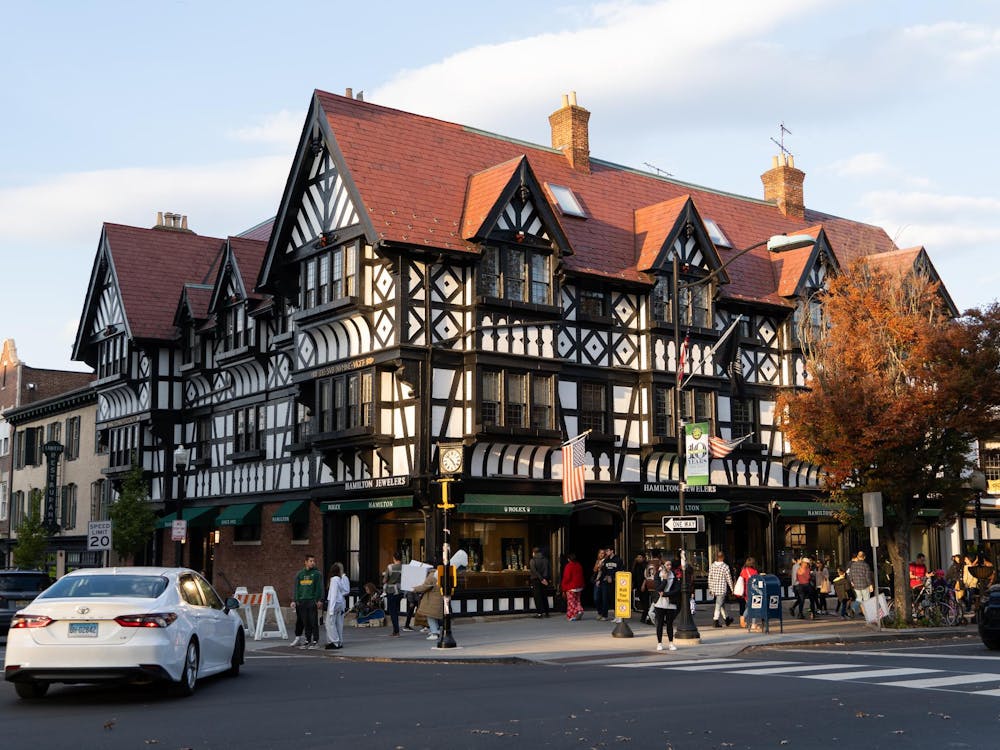Activist Tony Porter wants to create a new normal.
“I’m here representing the men, the generation of men that comes before you. Most of what you know from being a man you learned from me. So I’m not here telling you what you did wrong and all of that stuff,” Porter said. “I’m telling you that a lot of the things that I taught you we need to rethink and you have the opportunity to reteach.”
A cofounder of the nonprofit A Call to Men, Porter works to prevent domestic violence and promote healthy masculinity. He has advised several professional organizations, such as the National Football League and Major League Baseball. He is also the author of “Breaking Out of the ‘Man Box’: The Next Generation of Manhood.”
Much of Porter’s discussion engaged the audience on the topic of masculinity and how a hypermasculine culture has perpetuated issues like domestic violence.
“Domestic violence is so prevalent, sexual abuse is so prevalent in our society. You can’t put this many people in the room and not have several of us … impacted by it,” Porter said.
According to Porter, most people believe that domestic violence consists only of physical abuse, but he wants to raise awareness of psychological and verbal abuse, which are important parts of female survivors’ narratives.
“[Insults] become her name,” Porter said. “I have women tell me that ‘he even got the kids calling me the name.’ ”
Instead of asking women why they don’t just leave, Porter encouraged his audience to ask another question: Why doesn’t he just stop?
Partly, Porter said that it’s because domestic violence can — not all the time — pass from generation to generation.
“This is what we know: if I have 100 men in this room who all admitted to being perpetrators of domestic violence, 80 percent of them, 80 of them would say that they grew up in the room where they were affected by it,” Porter said.
According to the National Sexual Violence Resource Center, one in five women and one in 71 men will be raped in their lifetime. Among college-aged students, one in five women and one in 16 men will be sexually assaulted during their time on campus.
Mostly, Porter said, the violence against women can be attributed to a culture of unhealthy masculinity, which is kept alive by the silence of a majority of good men.

“[Men] are taught that men are strong and women are weak, and we try to limit any association with the word weak,” Porter said.
From a young age, boys are conditioned to believe that they need to hide their feelings to avoid being seen as weak, according to Porter. At five years old, Porter said, boys are starting to have the idea hammered into them. At ten years old, they are expected to have perfected it.
Porter relayed his own fault in this matter. With his daughter, he allowed her from a young age to cry, and he’d offer her support. But, with his son, he had hardly any tolerance for crying.
“When you tell a little boy to stop crying, you tell a little boy to stop feeling,” Porter said.
This mindset, he believes, is what has allowed people to see domestic violence in action and not speak up against it.
“In our socialization, we have created the fertile ground for violence to exist,” Porter said.
Throughout the discussion, Porter interacted with the audience and called on people to speak and answer questions. For his last activity of the night, he presented sample advertisements to the audience that denigrated women and asked student-athletes to describe why it is wrong that the image exists.
He believes that people need to be conscious of the less obvious dehumanization and objectification of women that exists in pornography, advertisements, and the overall pop culture.
“If we can’t put words to it, if we can’t challenge it, then the dynamics will stay in place,” he said.
Porter introduced Men’s Allied Voices for a Respectful & Inclusive Community (MAVRIC) Project to the audience at the end of his talk. The project works to foster a community that can talk about healthy masculinity.
The students, sports teams, and coaches who filled the room were deeply invested in the topics at hand.
Cade Keegan ’21 attended the discussion as a member of MAVRIC.
“Like [Porter] said with … socialization and fragile male ego, these types of topics aren’t talked about in male conversation, and making athletes and all men think about these things and create an environment to discuss them can help curb those problems over time,” Keegan said.
Paul Casey, an assistant coach for the lightweight men’s rowing team, found the emphasis on communication, especially among male athletes, intriguing.
“As an athlete, I’ve had a bunch of different types of coaches, and the most effective ones I’ve had … engaged in a dialogue, like I don’t know what’s going on in a boat other than what I can see,” Casey said. “And, so, what I found is that it’s just easier just to stop and ask the guys after a piece or whatever, what’s going on, what are you guys feeling.”
The dinner discussion was sponsored by Campus Conversations on Identities, SHARE, and the Women*s Center. It was held in the Carl A. Fields Center for Equality and Cultural Understanding on Oct. 18 at 8 p.m.








